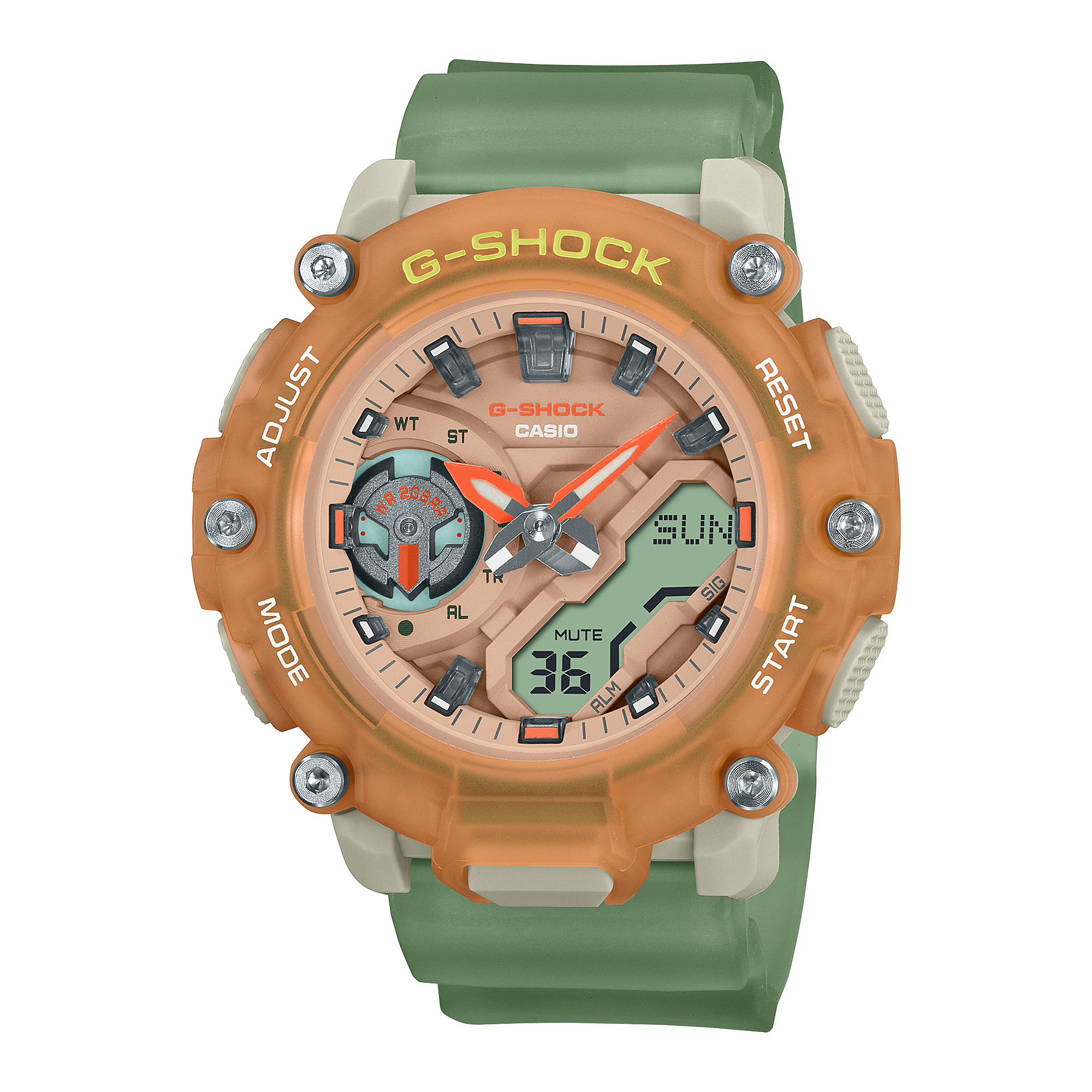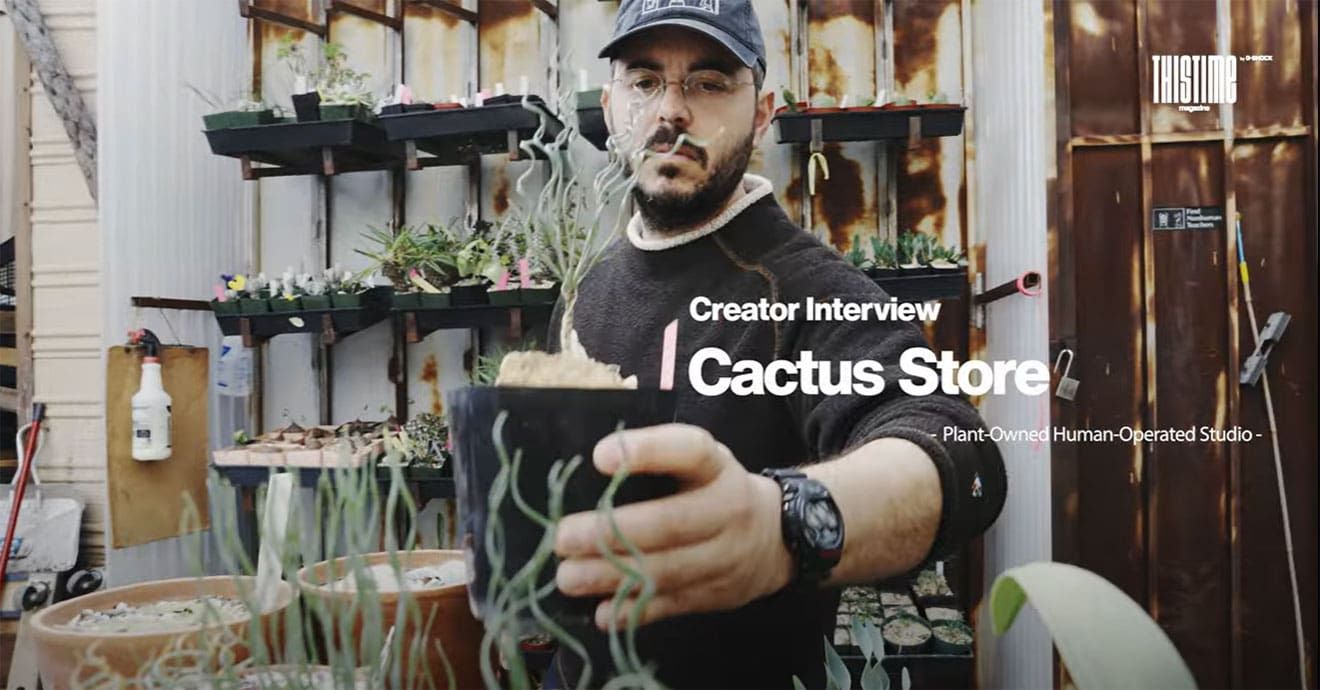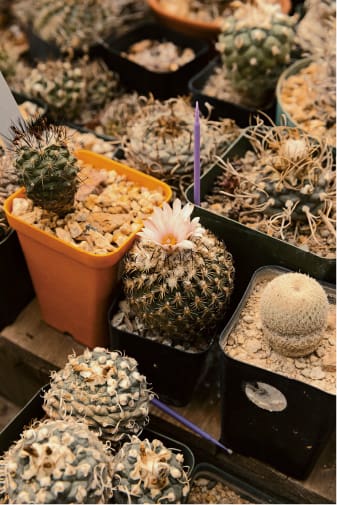Creator Interview
-Plant-Owned Human-Operated Studio-
Accumulated Time of Cacti
Honoring the Layers of Their Existence
Los Angeles is home to one of the most influential communities in the world of cacti and succulents.
The Cactus Store is the only plant shop that sells Apparel at select locations like Dover Street Market and Union.
Their artwork, inspired by the G-SHOCK DW-6900,
explores the concept of time - contrasting how cacti experience time with how humans perceive it,
ultimately questioning the nature of time itself.
We visited the Cactus Store studio, where creativity flourishes in unexpected ways.

The DW-6900 artwork, featuring a cactus shaped like a hand wearing the iconic watch, invites us to contemplate the nature of time—not just for humans, but for all living things.
Interview
Nature is a good “teacher.”
= “Nonhuman Teachers”
Nestled in a corner of Echo Park, a creative hub in Los Angeles, the Cactus Store began in 2014 as a true passion project of two cactus enthusiasts-Carlos Morera and his uncle, Johnny Morera. When they first opened, the shop had no sign, just an unassuming collection of cacti. But word quickly spread among the local community and the global cactus-collecting scene, and before long, people simply referred to it as the "Cactus Store." It was, quite literally, a cactus shop. Today, their offerings go far beyond rare cacti and succulents. They create apparel featuring botanical motifs, gardening tools. planters, and even perfumes. Among these, their T-shirts stand out as one of the most recognizable aspects of the brand. featuring bold, humorous graphics that have gained a cult following among fashion lovers. To learn more, we spoke with Max Martin, one of the original members of the Cactus Store.
―― Tell us about the Cactus Store.
It's hard to sum up in a few words, but everything we do is deeply rooted in nature and plant life. We've been making plant-geek T-shirts since the beginning, and in recent years, we've also been working in landscape design. Our studio hosts regular lecture events, too. It might seem like we're involved in many different things, but at their core, they're all connected.
―― Your work spans design, graphics, and more-it goes beyond just being a cactus shop.
We owe that to our local community and the people who have naturally gathered around us. Many of our current members were once regulars at the store. Some are talented photographers, others are artists, and some constantly bring fresh, unconventional ideas. Everyone has a unique skill set, but what unites us is a shared fascination with design and art. Cacti and succulents, in particular, are such rich, inspiring motifs that they spark endless creativity.

―― We hear that recently, you've been involved in landscaping projects worldwide.
Under the name Geoponica, we've worked on a variety of landscape projects. We've designed private gardens for a renowned American musician, a Los Angeles building by architect Kengo Kuma, and a Texas home by John Pawson. While most of our projects are in the U.S., we've also worked in Jamaica, Colombia, and Japan. Our collaborations in fashion include designing a window display for Saint Laurent, an office interior for Mad Happy, and a rooftop garden for A24, the acclaimed independent film studio. One of our members, Sofia Rondono, also works as an architectural artist, creating murals in hand-fired, greenglazed tile. Last year, she traveled to Jamaica to install a piece she had designed.
―― It seems like your focus has expanded beyond cacti and succulents to the broader natural world.
We're undeniably cactus geeks, but our curiosity doesn't stop there. More recently, we've been creating series centered on life and nature-tropical plants, fungi, marine creatures, and beyond. Humans are always learning from nature. We project our own struggles and aspirations onto the resilience of desert cacti. Through nature, we gain insight, and in many ways, nature is the ultimate teacher. That's why we use the phrase Nonhuman Teachers to describe our work.
―― The artwork features a blue cactus (Opuntia robusta) shaped like a hand wearing a G-SHOCK DW-6900. What was the idea behind this?
We wanted to combine two key elements: the cactus, which represents the Cactus Store, and the concept of time, symbolized by the watch. From there, we added an element of the surreal. Plants live for centuries, even millennia. Take the Welwitschia plant in Namibia-it grows just two leaves over its entire lifespan. The edges of its leaves wither, while its central trunk twists and expands, sometimes reaching the size of a small car. Seeing such a plant in its natural habitat is awe-inspiring-you can almost feel the immense time it has silently accumulated. A plant's lifespan can make a human lifetime seem fleeting. That's the nature of time in the wild, and it commands deep respect. Plants don't reveal their inner world as easily as humans do, but imagining their silent existence allows us to reflect on ourselves in a new way. I hope this artwork encourages people to experience that.

Their studio walls are lined with photographs of the landscapes they've designed. Living alongside plants, whose lifespans often far exceed our own, encourages deep refection on how we spend our time and how we choose to live.

One wall in the greenhouse features a mural by Sofa Rondono each tile, hand fred and glazed in delicate shades of green, represents cells on the verge of division.


The Cactus Store’s T-shirts, featuring a playful fusion of botanical motifs and wit, have cultivated a devoted following.

Cacti, which thrive in harsh environments, bloom as a testament to their resilience. With meanings like undying love and passion, they symbolize a strength that inspires those who see them.

Their studio is home to an incredible variety of plants, including those that have been abandoned by their owners. Each potted plant holds decades, sometimes centuries, of life within it.

One corner of the studio feels almost like a laboratory—evidence of the team’s deep expertise and passion for cacti. Their photo book Xerophile cemented their reputation, both for its wealth of knowledge and its striking visuals.

Near the entrance, the phrase Nonhuman Teachers catches the eye a recurring theme in the Cactus Store s work, refecting their philosophy of learning from plants and nature every day.
THISTIME MAGAZINE
Los Angeles Creator's Creative Scene



























